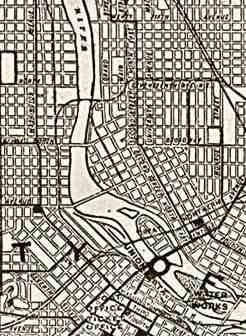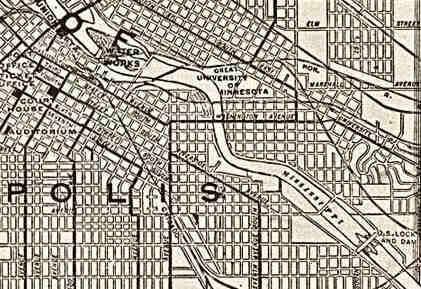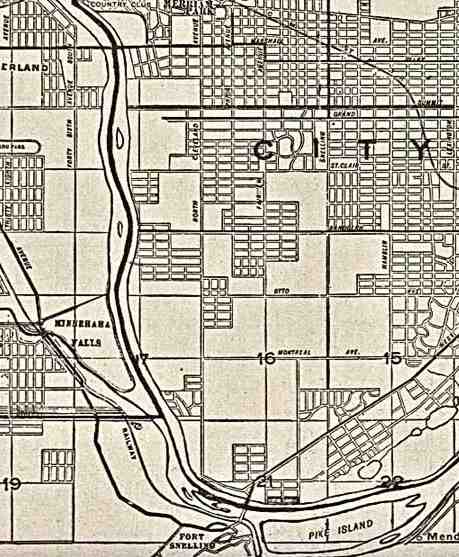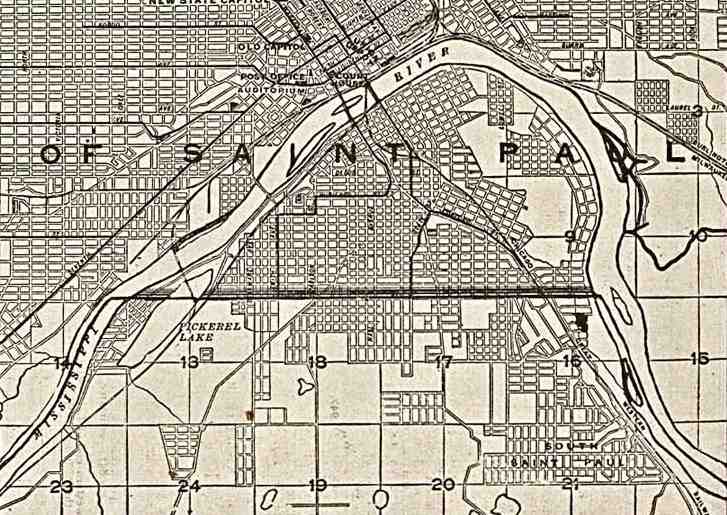Monument to the '91 Mill Fireby Gary Dop"Blessed are they who see beautiful things in humble places where other people see nothing." ~ Camille Pissarro A six-story electric guitar juts out over the water by the Stone Arch Bridge. Vines twist up through the strings to a ten-foot-wide lion's head, in full roar. Disco balls hang, distorting light, from the chrome tuning pegs. At the base, on a thin strip of river island, a grove of sugar-maples winds down the Mississippi. There, in the shadow of the Mill City Museum, a ghost of a tour guide whispers about the night Bren Torgerson quit med school and ran to the river. The night of the fire, he climbed to the Mill's abandoned roof, soaked in the river's indifferent gaze, slapped Zeppelin into his walkman, and lit a Marlboro between his teeth. Seizing the air above his left shoulder and the unseen strings by his belt, Bren ripped an air guitar solo for the ages. Stairway to Heaven ignited from the kinetic energy in his fingers, from his pure dismissal of social burden, from the Zippo at his feet-ignited the mill which melted around Bren as he burned through his five-alarm swan song, standing firm, blazing on the wooden stage, the flames flicking out across his River Styx, the glowing Mississippi. 
Where the river comes to confessby D. Garcia-Wahl"Chutes de Saint-Antoine" dedicated by Father Hennepin In the greater hour of a lesser tide, there is a humility about man that cannot be taught or falsified, even when arriving at the breach of your expectations. This is how a river leaves you; feeling distance from the refrain, seeing you as you were before, seeing you as you have never been. Where the river falls, prayer is as veiled as sin. For all that the river reflects will be its mask. The Unrequited Riverby Michael RambergNicolet Island She did not love him, so he came upstream where light was scant and current not so strong, and built the headrace of mills that fell silent long ago. She did not see the river made tributary to itself, nor hear the rage of winter-melt released on lime- stone cataracts, and was the better for it. He timbered the land, milled the trunks and burned the remainders for meager warmth. The ash he cast downstream, love notes writ in murky clouds, a script beyond her ken to know or his to speak aloud. Go to her now, the falls are saying, strengthen with the river. And by the end perhaps deserve her, though she would not be the one you once loved, and you would never again be the one who loved her.

On the Mississippi River Flatsby Thomas R. SmithScant grass stands lean among last autumn's cottonwood leaves. I take off my shoes. The leathery leaves and under-sand warm my bare feet. I follow Wordsworth a few pages into The Prelude, then doze under my straw hat, the book splayed open on my stomach. Waking, I raise myself on sandy elbows to squint out at the river. A rancid smell on the wind ... Out in the channel, twenty or thirty yards, something long and bloated churns the water. One of the city's unwanted homeless, dead man doing his face-down crawl? What looks like a burnt neck sinks down in the brownish foam. Then the current heaves it closer, and I see that the "body," with its billowy shirt of river water, is merely some unidentifiable lumber castoff... The young cottonwoods' leaves have begun in earnest their green semaphoring, sensitive to breezes other leaves don't register. Full of their annual enthusiasm, they have come to the only earth they'll know. There's hardly a place on these river flats not strewn with garbage or otherwise contaminated by the same pollutants that make the river unswimmable. The Mississippi, born in primal clarity, has no choice but to assume our wasteful burden. So does our own stream become swollen and corrupted, distorting the shining, clear idea we perhaps once were.
Here, the River Hauntby Bryan Thao WorraWashington Avenue Bridge Bodies of students young despair: An artist, the whispered, teeth and hair. Some spectral digits clasp at flags and tear. The wave and pavement witness near This campus of dreams, the shade and clear To see the windy seas our forms are from, our eerie erring ear That unwise winding butcher Time would cease and pare.

Walking Pike Islandby Norita Dittberner-JaxWe move separately through sheets of snow gathering in the field that lies between two rivers, the Mississippi and the Minnesota. Begun in mildness, the snow slows us and you ask, should we turn back, but I want to go on, want to reach the point of confluence. We follow the shoreline, the river quicksilver against snow and bark. We veer slightly, arrive suddenly at the point. Pike called this a natural site for a fortress, but the Dakota called it “center of the earth.” I think it is a marrying ground, joining water and land, river and river, where things come together. If we were getting married again, I would choose this spot. Your people would walk the Mississippi side and my people the Minnesota side and we would make confluence at this site. But we are already married, so we stomp our feet and bow to the waters flowing together. World War I Monument, East River Roadby Joel Van ValinI have a beacon for you boys dreaming in Flanders shades of the Argonne Forest, Belleau Wood. A pillar by the river haunting, stone flower cross on water-carved rock. No one alive remembers you. Banged by shells, rattled by artillery your parents facing the black days... Has the river quieted? Has the muddy time it churned run gleaming again? Past and present wed... And you and I both living, and both dead. Autumn Fallsby Michael GauseHidden Falls shows her diamonds The way somewhere an old bell sounds Like autumn, but born again

Down the Mississippiby Rhonda NiolaSt. Paul Down the Mississippi barges flow Their lights pulsating, a deep red glow. Tripping to the jazzy beat of a be-bop note Nearby my girl sways in her black fur coat Humming along in my ear, hushed and low. Tell me we loved once, a while ago We touched, felt the softness of fallen snow. I left for war; our love was set afloat Down the Mississippi. Our years are turning, quiet and slow But this much I'll always know Long as I might for an antidote Against time who comes like a swift clipping boat Down the Mississippi. River Copby Mary Kay RummelSt. Paul River Caves The other police didn't know what to do with his large hands and deep angers, so they gave him a boat and the river to patrol, uncharted territory, nude swimmers, drunken boaters, rope swings to cut down every night. They weren't prepared for his zeal or for the parade of nude boys, each day's catch shivering in blankets because he hid their clothes. My mother had to take the bus down to the station to claim my brothers. The Mississippi cut its way through the sandstone cliffs, wild bottoms of old St. Paul. The river cop's boat was a moving target as he chugged up and downriver waving his gun and threatening to shoot dogs, swimmers and hunters—down every day to check their traps. From the shelter of the river caves my brothers and their friends threw rocks and bottles at the boat. When they saw the river cop who couldn't swim, floundering in water they rescued him. One summer night Bill and Tom dragged a small civil war cannon from an attic to the Frankenstein caves below Otto Street. They loaded it with metal nuts and bolts. Soon the hollow clang of metal hitting the river cop's boat echoed down the river chamber, shook the glasses in West Seventh Street bars. Sirens filled the streets, but the police would never follow kids into caves where in the dark with the bats they toasted a new street legend. This was the late fifties. The boys who would die in Vietnam broke out of tiny yards. They never named the violence that cut thick, murky and sweet as the river through their street lives. |